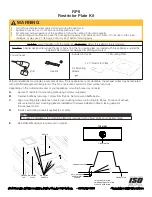
HANBAY Inc
User Manual RDx-B-xxxDT-10.31 Battery Fail Safe
Page 5 of 8
www.hanbayinc.com
Rev. 1 2019
1 800 315 4461
4-pos Functionality (Dip 8 ON)
Input#1
(Pin 1)
Input#2
(Pin 2)
Action taken
High
High
Moves to or remains in center position
Low
High
Moves to or remains in right position
High
Low
Moves to or remains in left position
Low
Low
Moves to or remains in back position
The feedback from the RDx-B-xxxDT is as follows:
Output#1
(Pin 3)
Output#2
(Pin 4)
Meaning
High = 4.5vDC Low = 0.8vDC
Low
Low
Actuator is at requested position
High
Low
Actuator is moving
Low
High
Actuator has stalled. The stall can be cleared by making the
actuator turn in the other direction.
Direction of rotation and using Input 1
To change the direction of rotation on the actuator change the setting on Dip12 and power up the actuator again.
VERY IMPORTANT: Input 1 must always be used if only one input is used to operate the valve.
When the actuator is operated using input 1 an automatic calibration is done every time the valve is
actuated. This does not happen on input 2.
Torque Settings:
Effect of power settings and speed settings:
To accommodate different valves and other applications with different torque requirements, the actuator can be
set to apply different torque on the valve stem when in the seating mode. Please see table on pg. 4 to select the
power setting that is right for your application.
The actuator will use 100% of available torque to try and reach maximum speed. Current drawn will be limited
proportionally to the DiP setting applied actuator will automatically slow down and deliver the maximum available
torque for a given “Permanent Power Setting”.
Top View
onto valve or
other
appliance
Center
Back
Right
Left
Note: 66% setting and 100% setting may alter duty cycle:
Supply voltage needs to be min 14 VDC for 66% setting
- Supply voltage needs to be 16 VDC for 100% setting
- When operating above 20VDC and 66% power, Duty cycle is reduced to 50% - 25% maximum.
At these levels, the electronics produce more heat which must be dissipated (depending on
environmental temperature)


























